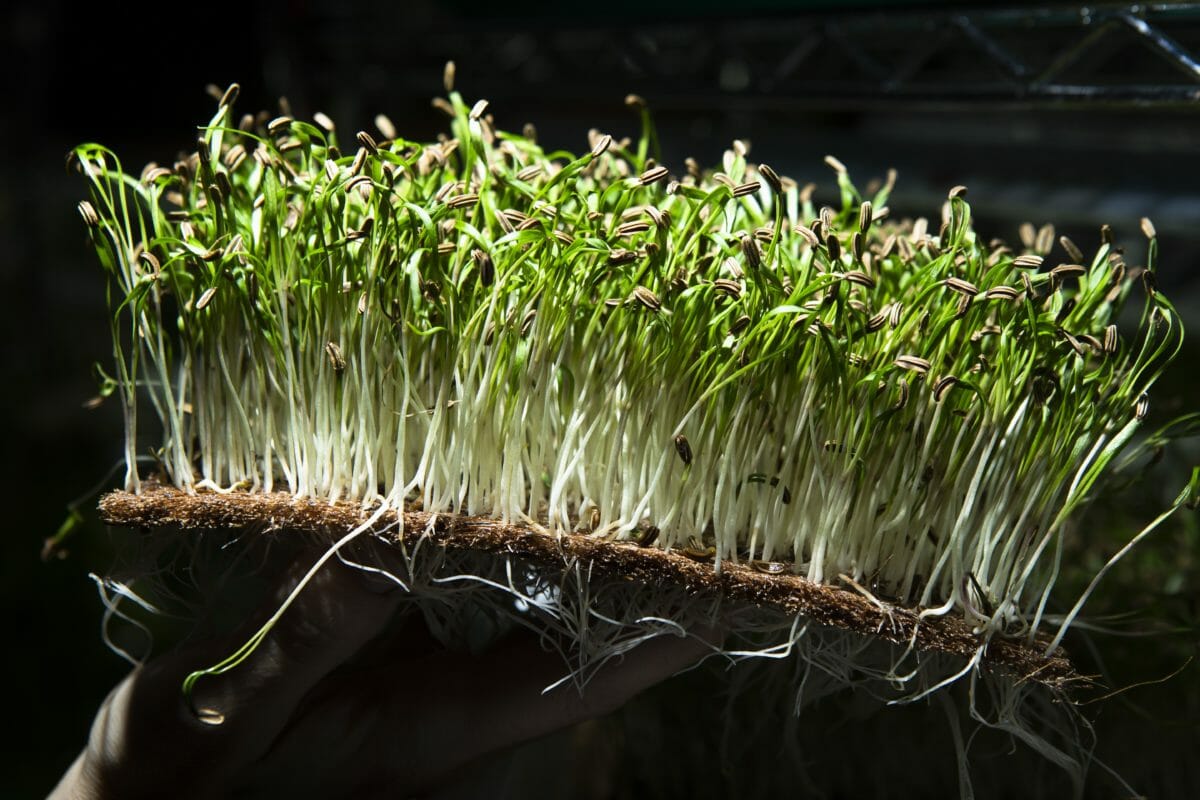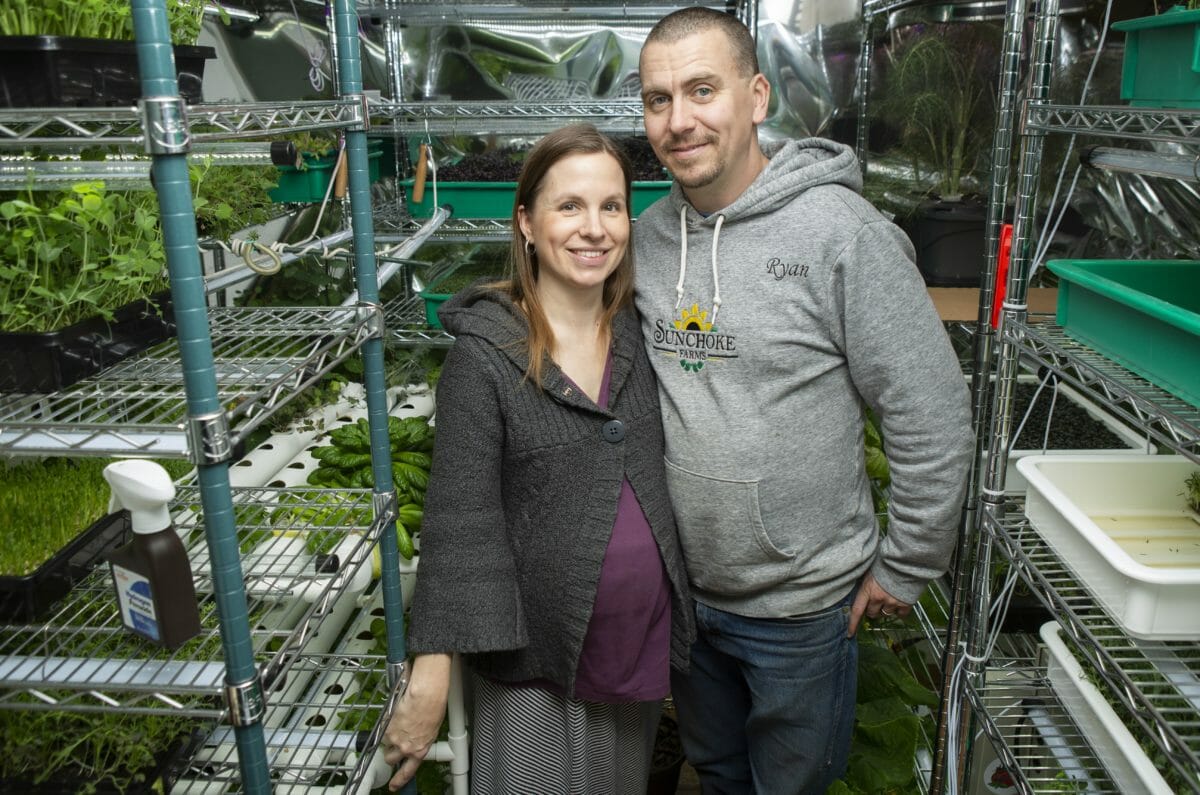A Farm Grows in South Bend
Meet the Modern Farmers: Susan and Ryan Greutman of Sunchoke Farms
Even as South Bend, Indiana has seen modest population growth in recent years, vacant lots are still scattered in parts of the city’s neighborhoods. Susan Greutman and her husband, Ryan, are trying to fill some of that space.
The Greutmans are the owners and operators of Sunchoke Farms, an urban farm located in the Near Northwest Neighborhood of the city. For many urban farmers, their biggest challenge can be finding enough space to grow their produce. That hasn’t necessarily been an issue for the Greutmans.
South Bend experienced a significant population loss after peaking in the early 1960s. This dip in population has been attributed to factories closing and the decline of heavy industry in the area. Much like other Midwest industrial cities, South Bend’s housing market was hit hard as manufacturing job losses and population decline added up over the years, resulting in large numbers of abandoned and vacant houses. More recently, former mayor and 2020 presidential hopeful Pete Buttigieg led a program aimed at tackling urban blight by repairing or demolishing more than 1,000 houses that were vacant or deemed unsafe under guidelines set by the state. This created more empty lots within the city.
The Greutmans and their seven children currently live in a house that was constructed on a lot, which they say had been empty for 30 years before their home was built there. The city has been working to repurpose the empty lots left behind, and the Greutmans see themselves as being part of this renewal process. “I think it’s a story of hope,” says Susan Greutman. “You know, no matter what happens, we as a town, we as a people, we as a family, we can take these problems and we can get through them. And we can find ways to work together with our community, and to work hard and accomplish things that need to be done.”
After Ryan Greutman lost his job at a water treatment plant in 2017, he struggled to find meaningful full-time work. The Greutmans soon decided to scale up their urban garden and were able to rent properties near their home from friends so they could farm full time. The family had raised vegetables and a small flock of chickens in their yards for years and were able to build off of their urban homestead lifestyle. In the spring of 2018, the couple started developing plans to expand the operation, which now involves farming just less than an acre of land on two rented empty lots, their backyard, a section of a neighbor’s yard, and a small indoor vertical farm for microgreens throughout the year.
People often react with confusion when they learn that the Greutmans’ farm takes up just less than an acre of space. When the couple tells them the size of their farm, “They look at you like ‘how is that possible?’” Susan Greutman says. For some, the idea that such a small amount of land could produce enough to support a family of nine is unusual compared to industrial farming stereotypes.

Sunchoke Farms currently sells microgreens to seven local restaurants, and all of the farm’s food is sold within a five-mile radius of the family’s homestead. While the family has no immediate plans to expand into more land, they’re looking to further maximize the space they currently have, with the hope of nearly doubling the amount of produce they turn out every week.
The Greutmans allocate only a small area for certain crops they sell at their stand in nearby farmers’ markets and make sure to space out the timing of when seeds are planted for other crops. These actions are more deliberate and come from experiential knowledge they are gaining as they continue to build their business. As they’ve set up their farm, they’ve found ways to be more efficient, and learned what products sell better in different markets.
Follow us

This work is licensed under a Creative Commons Attribution-NoDerivatives 4.0 International License.
Want to republish a Modern Farmer story?
We are happy for Modern Farmer stories to be shared, and encourage you to republish our articles for your audience. When doing so, we ask that you follow these guidelines:
Please credit us and our writers
For the author byline, please use “Author Name, Modern Farmer.” At the top of our stories, if on the web, please include this text and link: “This story was originally published by Modern Farmer.”
Please make sure to include a link back to either our home page or the article URL.
At the bottom of the story, please include the following text:
“Modern Farmer is a nonprofit initiative dedicated to raising awareness and catalyzing action at the intersection of food, agriculture, and society. Read more at <link>Modern Farmer</link>.”
Use our widget
We’d like to be able to track our stories, so we ask that if you republish our content, you do so using our widget (located on the left hand side of the article). The HTML code has a built-in tracker that tells us the data and domain where the story was published, as well as view counts.
Check the image requirements
It’s your responsibility to confirm you're licensed to republish images in our articles. Some images, such as those from commercial providers, don't allow their images to be republished without permission or payment. Copyright terms are generally listed in the image caption and attribution. You are welcome to omit our images or substitute with your own. Charts and interactive graphics follow the same rules.
Don’t change too much. Or, ask us first.
Articles must be republished in their entirety. It’s okay to change references to time (“today” to “yesterday”) or location (“Iowa City, IA” to “here”). But please keep everything else the same.
If you feel strongly that a more material edit needs to be made, get in touch with us at [email protected]. We’re happy to discuss it with the original author, but we must have prior approval for changes before publication.
Special cases
Extracts. You may run the first few lines or paragraphs of the article and then say: “Read the full article at Modern Farmer” with a link back to the original article.
Quotes. You may quote authors provided you include a link back to the article URL.
Translations. These require writer approval. To inquire about translation of a Modern Farmer article, contact us at [email protected]
Signed consent / copyright release forms. These are not required, provided you are following these guidelines.
Print. Articles can be republished in print under these same rules, with the exception that you do not need to include the links.
Tag us
When sharing the story on social media, please tag us using the following: - Twitter (@ModFarm) - Facebook (@ModernFarmerMedia) - Instagram (@modfarm)
Use our content respectfully
Modern Farmer is a nonprofit and as such we share our content for free and in good faith in order to reach new audiences. Respectfully,
No selling ads against our stories. It’s okay to put our stories on pages with ads.
Don’t republish our material wholesale, or automatically; you need to select stories to be republished individually.
You have no rights to sell, license, syndicate, or otherwise represent yourself as the authorized owner of our material to any third parties. This means that you cannot actively publish or submit our work for syndication to third party platforms or apps like Apple News or Google News. We understand that publishers cannot fully control when certain third parties automatically summarize or crawl content from publishers’ own sites.
Keep in touch
We want to hear from you if you love Modern Farmer content, have a collaboration idea, or anything else to share. As a nonprofit outlet, we work in service of our community and are always open to comments, feedback, and ideas. Contact us at [email protected].by Evan Cobb, Modern Farmer
February 16, 2020
Modern Farmer Weekly
Solutions Hub
Innovations, ideas and inspiration. Actionable solutions for a resilient food system.
ExploreExplore other topics
Share With Us
We want to hear from Modern Farmer readers who have thoughtful commentary, actionable solutions, or helpful ideas to share.
SubmitNecessary cookies are absolutely essential for the website to function properly. This category only includes cookies that ensures basic functionalities and security features of the website. These cookies do not store any personal information.
Any cookies that may not be particularly necessary for the website to function and are used specifically to collect user personal data via analytics, ads, other embedded contents are termed as non-necessary cookies.

What an exciting story and beautiful enterprise! I teach a sustainability-focused course for first-year students at Notre Dame, and I would love for my students to see this farm family in action! I’ll be getting in touch with you, Greutmans!
Hello Greutmans,
I would the love to speak with you regarding your organization if possible. I was referred to speak with you by Mr. Matthew Stackowicz. He is my Rise program director at Ivytech. I am a entrepreneur and organizer of a nonprofit organization Community Beauty which concentrates on economic development, social advancement, and sustainability in underserved and minority communities by creating community youth engagement centers, landscape revitalization, housing exterior remodeling and construction and daytime adult financial literacy participation programs. I look forward to hearing from you.
All the best,
Alisha Bell
Entrepreneur/Organizer
Community Beauty
Impressive!
Do you do tours? We would love to bring our granddaughter to see where her veggies come from in this modern era.
And here I thought this was an article about farming….